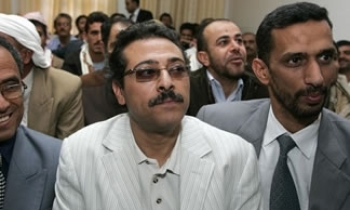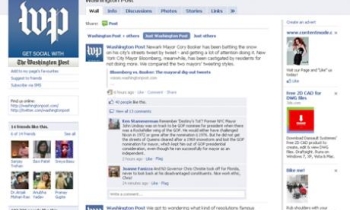The Federal Bureau of Investigation has released 20 pages of files on President George W. Bush to an activist blogger who sought the president’s records under a Freedom of Information Act request last summer, RAW STORY has learned.
The release, which comprises two threats made against the President in 2001 and 2003, is scant. It includes letters from the U.S. Secret Service to the FBI forensic laboratory to request DNA analyses and the lab’s replies. There is no information about the president’s background.
Michael Petrelis, who keeps a blog and is a longtime gay activist, obtained the file last week and believes the FBI has withheld much of their records on the president. Those who deal regularly with such requests tell RAW STORY most of the president’s file is protected under the information law.
The records’ release, however small, may mark a new landmark in blogger journalism. Petrelis says his frustration with the mainstream media’s lack of attention to the president’s record led him to make the request himself. Thousands of pages relating to Sen. John Kerry’s activities with Vietnam Veterans Against the War have been released, as organizations are not given the same privacy rights as individuals under the law.
Petrelis' claim that no other media organization has requested Bush's files was substantiated by the FBI FOIA office in October 2004, when RAW STORY first ran a piece on Petrelis' effort. Debbie Beatty, who works in the Historical and Executive Review Unit at the FBI and spoke for the FOIA office, stated that to her knowledge, no other media organization has requested Bush’s file.
"Not that I’m aware of," Beatty said. "I supervise all incoming mail."
Petrelis was twice denied appeals to the FBI to expedite the release of Bush’s file. In Sept. 2004, he wrote, "The outcome of November second's presidential election could well be determined on what's in the Bush and Cheney FBI files. Voters may cast their ballots based on not just the contents of those files, but also on the hundreds of pages of FBI dossiers the agency kept on Sen. John Kerry since the 1970s, and which were released in March 2004, to tremendous media and public scrutiny."
Members of several watchdog groups declined to comment, saying they didn’t have enough expertise as regards information requests surrounding the president. Most were surprised that the FBI had released anything at all.
Steve Aftergood, Director of the Project on Government Secrecy at the Federation of American Scientists, says he wasn’t surprised the FBI’s release was meager.
"In order to get a substantive release, the subject of the request has to grant a [privacy] waiver," Aftergood said. "One wouldn’t expect any kind of personal details unless a privacy waiver has been granted."
The enclosed letter from the FBI says that 20 pages were reviewed and 20 pages were released.
Asked whether public officials are held to a different standard than private citizens, Aftergood remarked, "Only to the extent that it involves public activity. Even a public official has privacy rights."
Petrelis said he was pleased that he had received something, but isn’t satisfied.
"A slim, meager, puny portion of the FBI files that they’ve released on Bush is not the full picture," he said. "It’s not the full file. And the FBI has not been responsive to my FOIA request. My FOIA request was that they would search all of their archives."
"I just don’t think 20 pages are all they have," he added.
FBI spokesman Paul Bresson told RAW STORY that much of the president’s records are protected by privacy provisions in the law. He also stated that the FOIA laws are complex, and include many exemptions. On such exemption, he said, is if "an individual who made a threat made multiple threats and are currently the target of ongoing cases."
"Most of the time when you hear about famous people, they’re victims of some sort," he said. "In the case of a president it’s probably not at all unusual that they president receives threats of some kind whether it’s emails or phone calls or what have you."
Bresson stressed that the FBI does not keep files on individuals. He says the FBI complies with FOIA requests by scanning for individuals' names among the bureau’s case files.
"When a request comes in for a name, we process the request by seeing if anyone comes up," he said.
"It’s not that we keep files on people," he added. "We have investigative files in which names surface."
The idea of a Bush file, Bresson said, is a misnomer.
"It’s not really the George Bush file," he stated. "It’s a collection of files that contain his name."
"There’s some information that can be divulged about a sitting president," he continued. "It’s limited in scope... There’s a lot of sensitivities and then you have his privacy rights as a citizen are the same as anybody else."
Aftergood says Petrelis might be able to obtain more information by asking for details about the president’s public interactions.
"How many times has the FBI director been summoned to the White House?" he proposed as a suggested area of inquiry. "How many times has the president been to the FBI? What communications if any between the White House and FBI are releasable?"
"Without quite knowing what you’re looking for, it’s possible to request categories of information that might be interesting," he added.
In a public letter issued in response to the FBI’s release, Petrelis rebukes the mainstream media for what he believes was a failure to fully investigate President Bush. He has also asked for the bureau's files on Vice President Dick Cheney, though he has received nothing to date.
"How it could it be that during the most important election of the past half century, the supposed liberal media could devote resources, ink and airtime to the FBI files of only one of the two major contenders for the White House, and totally ignore what the agency may have on the other candidate?" he penned.
"To their shame, no mainstream news outlet, liberal or conservative, bothered to investigate what the FBI has in its archives on Bush or efforts to obtain his file," he added.
Petrelis, along with Aftergood, do however see some success in the limited information released by the FBI.
"Even records about the president may be obtained under FOIA even though the White House itself is exempt from FOIA," Aftergood said. "You never know quite what to expect."
"If a team of AP lawyers or lawyers from the New York Times decided they wanted more, they would get more," Petrelis opined. "I hope others will be spurred into filing FOIA requests for FBI files."









